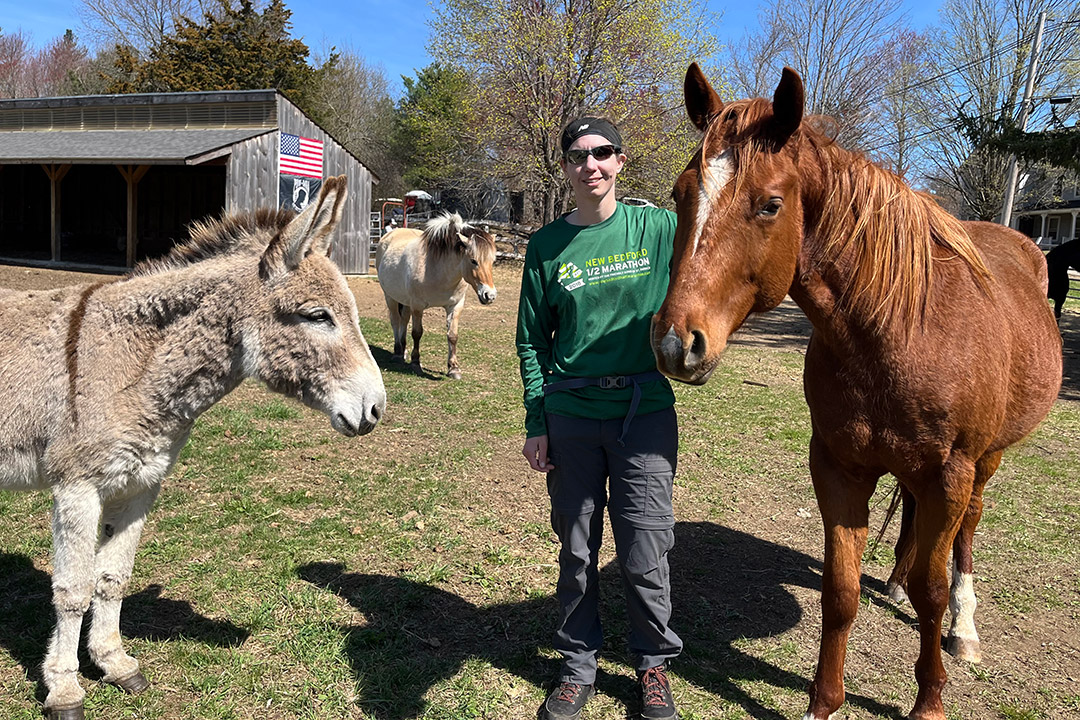Hannah DeFelice’s environmental research could impact agricultural industry, improve animal welfare

Provided
RIT student Hannah DeFelice is studying how the environmental conditions in paddocks and stalls, such as grass cover, soil condition, and space influence the behavior, health, and welfare of animals. After graduating, DeFelice will work toward her doctoral degree in biogeochemistry at Cornell University.
Over the past few months, RIT student Hannah DeFelice has looked forward to going to her internship office—a paddock in the center of a Holliston, Mass., farm—and spending quality time with her co-workers, a herd of 11 horses and three donkeys.
But this isn’t just horseplay. DeFelice’s research to improve animal welfare is taking her to Cornell University this fall to pursue her doctoral degree in biogeochemistry, the study of how living things interact with the physical and chemical environment.
The master’s in environmental science student is studying how the environmental conditions in paddocks and stalls, such as grass cover, soil condition, and space influence the behavior, health, and welfare of animals. Her work is grounded in the “One Health” concept, which explores the connectivity among environmental, animal, and human health.
“I love working with animals and have long been interested in environmental science,” said DeFelice, a Maine native, whose work is being conducted through Equine International. “My research allows me to contribute to the animals’ well-being in a tangible way. Horses and donkeys are such intelligent and sensitive creatures, and it’s important that we understand how their environments can either support them or harm them.”
DeFelice, who is supported by RIT’s National Technical Institute for the Deaf as a DeafBlind student, is also assessing insect and microbial populations to understand the risk of infectious diseases and parasites.
She believes her research could have broader implications for the agricultural industry, especially small farms.
“My hope is that my findings will help farmers and ranchers design better paddocks that improve animal health and productivity while also maintaining environmental sustainability, and influence actionable recommendations to improve animal welfare,” she said.
With the support of faculty members, including Carmody McCalley, director of RIT’s environmental science master’s degree program, DeFelice has made studying the environment her passion. By incorporating research skills acquired at RIT, including GIS mapping and data mining, she is positioning herself as an expert in delicate ecosystems. In fact, she has traveled to the Arctic twice with McCalley to study permafrost, the release of greenhouse gases into the atmosphere, and climate change.
“What stands out to me about Hannah are her genuine love of science and research and her passion for making these more accessible and inclusive for those with disabilities,” said McCalley. “Hannah and I have performed many research projects together. It’s great to work with a student who enjoys doing the ‘dirty work’ and has the ability to focus and concentrate on tasks that some might consider tedious but are so essential to good science. She was also patient enough to teach me how to sign numbers so that we could communicate faster in the field, which I really appreciated.”
DeFelice said she has learned to begin trusting herself and her instincts when it comes to her expertise.
“Throughout my internship, I have been asked my professional opinions on many subjects, including animal behavior, and have become adept at field work, nutrient analysis, pollinator assessment, and so many other things,” she added. “All of this I have learned through my time at RIT.”
DeFelice also participates in the Rochester Bridges to the Doctorate program, which provides scientific mentoring for deaf and hard-of-hearing individuals to become strong candidates for doctoral degree programs in biomedical or behavioral science disciplines.









